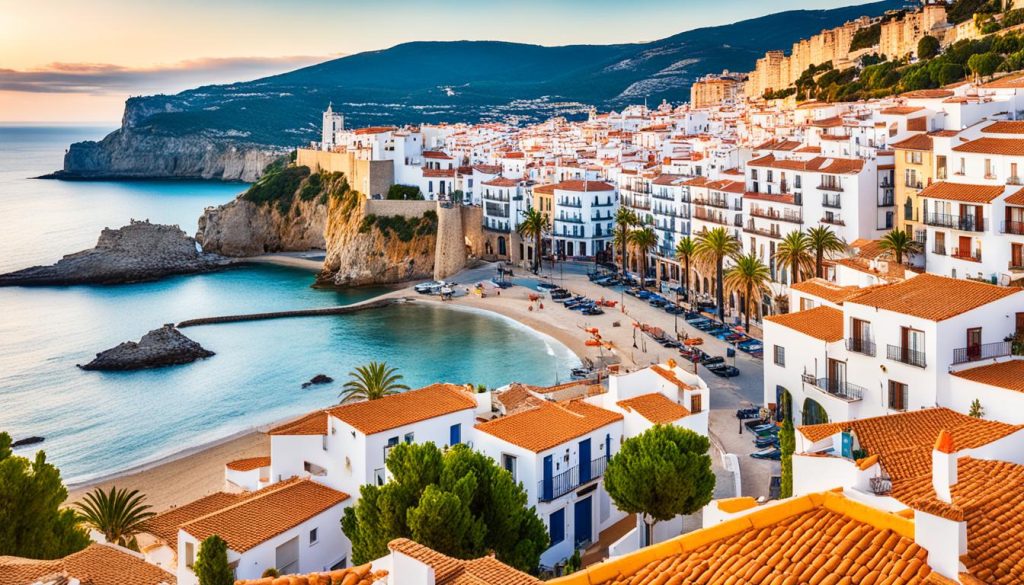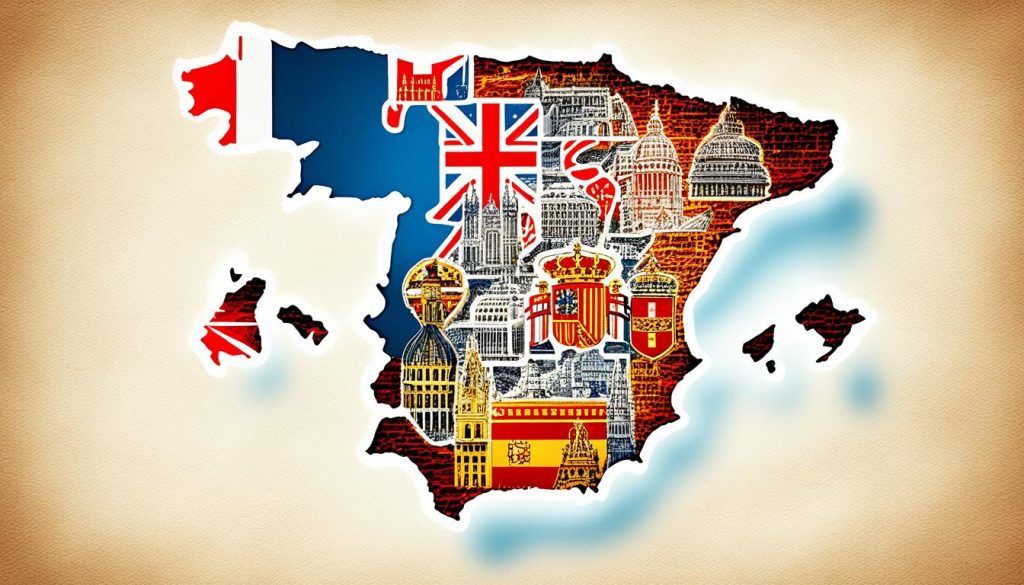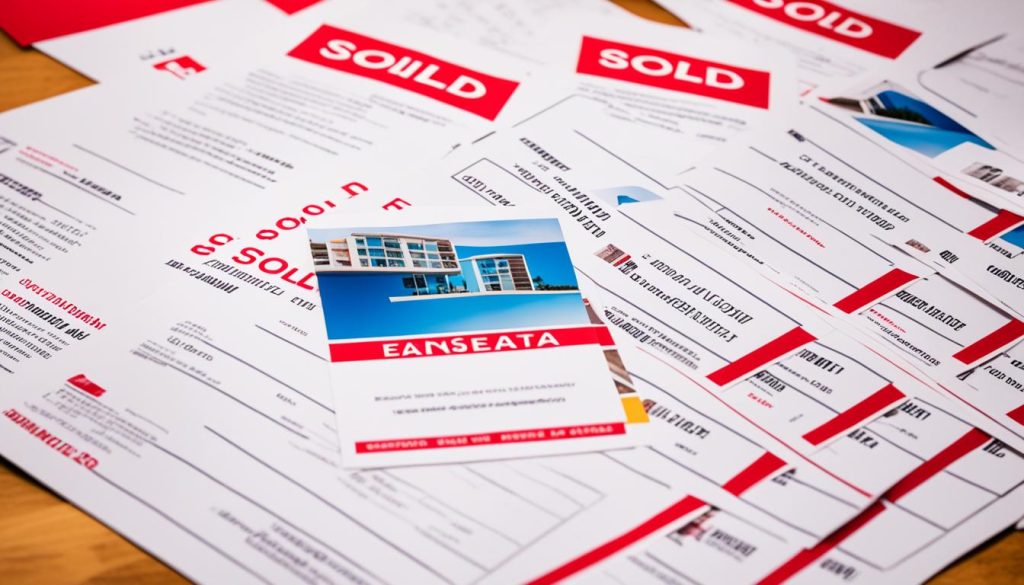This guide is for UK investors wanting to know more about Spain’s real estate. It’s perfect whether you’re buying for yourself or as an investment. We’ll give you the confidence to move through the Spanish property market smoothly.
Key Takeaways
- The real estate scene in Spain offers opportunities for UK investors looking to buy a property.
- Whether for personal use or investment, understanding the Spanish property market is crucial.
- Types of properties in Spain vary from traditional villas to modern apartments.
- Popular Spanish regions for real estate investment include Barcelona, Madrid, and the Costa del Sol.
- Legal and financial considerations must be taken into account when investing in Spanish real estate.
Understanding the Spanish Property Market
Before you start investing in the Spanish property market, it’s key to understand its current state and what influences it. Knowing the market trends and dynamics helps you make smart investment choices.
The Spanish property market has changed a lot in recent years. It went down during the global financial crisis but is now recovering. This recovery has drawn both local and international buyers.
Spain is a popular choice for investors because of its beautiful beaches, landscapes, and lively cities. People want second homes, retirement places, and properties to rent out here.
The market has a wide range of properties for different tastes and budgets. You can find everything from modern flats in city centers to beautiful villas in quiet countryside areas.
It’s important to look at property prices and demand in different regions when investing. Some areas are more in demand and have higher prices, while others might be more affordable or have great potential.
Knowing the legal and regulatory aspects of the Spanish property market is crucial. Learn about the process of buying property, the rights and duties of buyers and sellers, and what foreign investors need to know.
Understanding the financial side of investing in Spanish real estate is also key. Look into financing options and foreign investment rules to plan your purchase well.
Doing your homework and researching the market is essential for a successful investment in Spain. Find out about market trends, rental income, and areas with growth potential. Talking to local real estate agents and other investors can give you useful advice and help you make better decisions.
By getting to know the Spanish property market well, you can take advantage of its opportunities. This knowledge helps you make investments that fit your goals and how much risk you can take.
Types of Properties in Spain
Investing in real estate in Spain offers a wide range of property types. Each type has its own unique features and benefits. They cater to different tastes and lifestyles. Here are some of the most popular types of properties in Spain:
Villas and Townhouses
Villas and townhouses are popular for their size, privacy, and luxury. They often have private gardens, pools, and beautiful views. These are great for those who value comfort and privacy.
Apartments and Condos
For a city lifestyle, apartments and condos are a top choice. They’re in city centres or coastal areas, close to shops, entertainment, and culture. You can find everything from small studios to large penthouses, fitting various budgets and needs.
Rural Cottages and Finca Estates
If you want a peaceful life in the countryside, consider rural cottages and finca estates. These are in quiet areas, away from city life. They have big gardens, vineyards, or olive groves, perfect for nature lovers and those wanting a calm life.
Coastal Retreats
Spain’s coasts have beautiful retreats for both holidaymakers and those living there. These include beachfront villas, seaside apartments, and townhouses by the water. They offer easy beach access and stunning sea views, making them very sought after.
Investment Opportunities
Spain also has properties for investment, like hotels, resorts, and commercial buildings. These can be good for investors wanting to make money from tourism or start businesses in tourist spots.
With so many property types, think about what you want, your budget, and your investment goals. Look into popular areas and get advice from real estate agents to find the right property for you.
Popular Spanish Regions for Real Estate Investment

Spain is a top choice for real estate investors. It has many regions that are popular for investment. Each region has its own charm and potential for making money. Let’s look at some of the best regions in Spain for real estate investment.
1. Costa del Sol
The Costa del Sol is in Andalusia and is famous for its beautiful beaches, lively nightlife, and great golf courses. It draws tourists and retirees, making it a good place for rental properties. This means investors can earn steady rental income.
2. Barcelona
Barcelona is the capital of Catalonia and a busy city with a rich culture, stunning buildings, and amazing food. It has a strong real estate market. This makes it a great choice for investors who want to make money from rentals.
3. Mallorca
Mallorca is the biggest island in the Balearics and is a paradise with beautiful views, clear waters, and quaint towns. It’s getting more popular with tourists, offering a good chance for investors to make money from holiday rentals.
4. Costa Blanca
The Costa Blanca is along Spain’s eastern coast and is known for its lovely beaches, warm weather, and pretty towns. It has a variety of affordable properties. This makes it a good spot for investors looking for rental income.
5. Madrid
Madrid is Spain’s capital and a big city with a mix of old and new buildings. It has a lot of professionals and students, which means a high demand for rentals. Investors can make a steady income from renting out properties here.
These regions are just a few of the places in Spain that investors like. Each region has its own benefits, like beautiful views, lively cities, or strong rental demand. By looking into each region’s potential and doing their homework, investors can make smart choices and earn well in the Spanish real estate market.
Legal and Financial Considerations
Buying property in Spain means looking at the legal and financial sides. Whether it’s for a holiday home or a business, knowing the legal and financial details is key. This knowledge helps you make smart choices before you buy.
Legal Considerations
Buying property in Spain means understanding the legal steps. A good Spanish lawyer who knows about real estate can guide you. They check the property’s ownership, liens, and legal issues.
It’s also good to know about laws on owning property in Spain. This includes the Spanish Land Registry, zoning laws, and planning permissions. Knowing these laws helps you make better decisions and avoid problems.
Financial Considerations
Before investing in Spanish real estate, think about the money side. Here are some things to consider:
- Property Prices: Look into the property market in your area to see what prices are like. This helps you check if the property fits your budget.
- Taxation: Learn about taxes on property in Spain. This includes taxes when you buy, wealth tax, and taxes on rent if you rent it out. Knowing these taxes helps you plan your money better.
- Financing Options: If you need a loan for your property, look at your options. Compare lenders, their rates, terms, and what you need to qualify. A good mortgage broker can help find the best loan for you.
- Additional Costs: Don’t forget about extra costs like legal fees, notary fees, and property taxes. These can add up and affect your investment.
- Currency Exchange: As an investor from abroad, exchange rates matter. Talk to a foreign exchange expert who deals with property transactions to protect you from bad rates.
Thinking about the legal and financial sides of Spanish real estate helps you make smart choices. It reduces risks and can make your investment successful and profitable.
Finding a Real Estate Agent in Spain
Buying property in Spain? A real estate agent in Spain is key. They know the local market well and can make buying smooth. Their knowledge helps you through the complex process.
So, how do you find the right agent? Consider these important factors:
1. Research and Referrals
Start by researching real estate agents in Spain. Find agents who know the area you want to buy in. Check their websites, read reviews, and ask friends or colleagues for advice.
2. Credentials and Experience
Check an agent’s credentials and experience. Make sure they’re licensed and registered with a group like the Spanish Real Estate Agents Association (API). Look for agents with lots of experience and a good track record.
3. Local Knowledge
A local expert is priceless. They should know about the area’s trends, property values, and new developments. This knowledge helps you make smart choices and find great deals.
4. Communication and Language Skills
Good communication is key. Pick an agent who speaks your language well. Even if many agents speak English, make sure there won’t be any language problems.
5. Professional Network
Choose an agent with a wide network of professionals. This includes lawyers, mortgage brokers, and property inspectors. Their connections can make buying easier and give you reliable advice.
6. Personal Compatibility
It’s important to get along with your agent. You should feel free to talk about what you want and your budget. A good agent will listen to you and find properties that fit your needs.
Follow these tips to find a great real estate agent in Spain. They’ll help you buy property with expertise and care.
| Benefits of Working with a Real Estate Agent in Spain | Drawbacks of Buying Without a Real Estate Agent in Spain |
|---|---|
| – Access to a wide range of property listings – Local market expertise and insights – Assistance with negotiation and paperwork – Professional network of trusted contacts |
– Limited access to property listings – Lack of local market knowledge – Potential language barriers – Difficulty navigating legal and financial requirements |
Buying property in Spain is a big step. With a good real estate agent, you can do it with confidence and ease.
Property Viewing and Due Diligence
Once you’ve found potential properties, it’s time to see them in person. This step is key to understanding the property’s condition and if it fits your needs. Always look closely and do your homework to make a smart choice.
Why Property Viewing Matters
Seeing a property up close lets you go beyond online images and descriptions. It helps you check the property’s features and spot any problems. Walking through the property lets you feel its size and condition.
Viewings also let you imagine living or investing in the space. You can see the area, how close it is to shops and services, and what’s around the property. This helps you decide if the property is right for you.
Conducting Due Diligence
It’s crucial to check carefully during viewings to spot any issues. Here are important things to look at:
- Structural Integrity: Look for damage or instability, like cracks or dampness.
- Mechanical Systems: Make sure plumbing, electrics, heating, and cooling work well.
- Maintenance: Watch for signs of poor upkeep, which could mean expensive repairs later.
- Legal Compliance: Check the property has all legal papers and permits.
- Neighborhood and Surroundings: Look at the area for safety, shops, and any future changes that might affect the property’s value.
Doing your homework during viewings helps you spot problems that could change your mind about buying.
Next Steps
After viewing properties and checking them out, you’ll know what to do next. If the property is right and you’re happy, you can make an offer and start negotiating.
Remember, viewing properties and checking them out are key steps together. Taking your time to look at each property carefully helps you make a choice that fits your goals and dreams.
Negotiating and Making an Offer
Negotiating and making an offer is key in buying property. Using good negotiation skills can help you get the property you want at a good price. Here are some tips and strategies for negotiating and making offers:
1. Research and Gather Information
Before you start negotiating, gather as much info as you can about the property and its market value. Look at similar properties in the area to understand the market and prices. This will help you plan your negotiation strategy.
2. Define Your Maximum Budget
Knowing your top budget helps you figure out the highest price you can pay. It’s important to set a limit and stick to it, but be ready to adjust as negotiations go on.
3. Start with a Reasonable Offer
Begin with a fair offer rather than a low one. A reasonable offer shows you’re serious and makes the seller more likely to negotiate. Think about the property’s market value, your budget, and what might affect the seller’s decision.
4. Clearly Communicate Your Offer and Terms
When you make your offer, be clear about the terms and conditions. Include the purchase price, any conditions, timelines, and other important details. Being clear and open helps the seller understand your position and makes negotiations smoother.
5. Remain Flexible
Negotiations often go back and forth as both sides try to agree. It’s important to be flexible and open to compromise. Think about other options or concessions you could make to get a good deal.
6. Seek Professional Guidance
If you’re not good at negotiating or want expert advice, think about getting a skilled real estate agent or lawyer. They can help you through the negotiation process, offer valuable insights, and protect your interests.
| Advantages of Negotiating | Benefits of Making an Offer |
|---|---|
| Opportunity to secure the property at a lower price | Expresses your serious intent to purchase |
| Potential for additional concessions or favorable terms | Allows you to outline specific conditions and timelines |
| Ability to address any concerns or issues before finalizing the purchase | Gives the seller a clear understanding of your offer |
Property Purchase Process in Spain
For UK investors looking to buy property in Spain, understanding the process is key. Whether it’s for a holiday home, investment, or moving permanently, knowing the steps helps you buy smoothly.
Step 1: Research and Planning
Start by researching and planning your purchase in Spain. Set your budget, choose a location, and decide on the type of property you want. This makes finding the right property easier and ensures it meets your needs.
Step 2: Engage a Real Estate Agent
Working with a good real estate agent in Spain can make buying property easier and safer. They know the local market well, help with viewings, negotiate for you, and offer advice on legal and financial matters.
Step 3: Property Due Diligence
After finding a property, do your due diligence. Check the property’s legal status, debts, planning permissions, and local rules. A lawyer who knows Spanish property law can help you with this.
Step 4: Reservation Agreement and Deposit
Once you’re happy with your findings, sign a reservation agreement and pay a deposit. This is usually 10% of the price. The agreement sets the sale’s terms and removes the property from the market while you complete the sale.
Step 5: Completion and Notary
The property purchase is finalized at the notary’s office. The notary is a legal expert who transfers property ownership. Both buyer and seller, or their reps, sign documents to complete the deal.
Step 6: Taxes and Fees
Buying property in Spain means paying various taxes and fees. These include transfer tax, VAT, notary fees, land registry fees, and legal fees. Knowing these costs is important for your budget.
Step 7: Property Registration
After finalizing the purchase, register the property at the Land Registry. This makes you the official owner and proves your ownership legally.
By following these steps and staying informed, UK investors can make smart choices in Spain’s property market. Getting professional advice, doing due diligence, and working with trusted partners helps ensure a smooth property purchase. Now, you know the process well and can confidently pursue your Spanish property goals.
Financing Options for UK Investors

If you’re a UK investor eyeing the Spanish property market, knowing your financing options is key. Whether it’s for a holiday home or a long-term investment, different financing paths can help you achieve your goals in Spain.
Mortgages from Spanish Banks
Getting a mortgage from a Spanish bank is a popular choice for UK investors. Spanish banks offer good loan terms for non-residents, with ratios from 60% to 70%. These loans are in euros, which can lessen the effect of currency changes for UK investors.
UK-Based Lenders
UK lenders also offer financing for Spanish property. They have buy-to-let mortgages for investors aiming to earn rental income. Talking to a mortgage broker who knows international property can help you look into these options.
Alternative Sources of Funding
UK investors can also look at non-traditional funding for their Spanish properties. Private lenders and peer-to-peer platforms offer flexible loans with quicker approval times. Using UK property equity or other investments as collateral could also be an option.
Choosing a financing path requires working with legal and financial experts familiar with cross-border deals. They can help you with the process and ensure you follow UK and Spanish laws.
By understanding the financing options for UK investors, you can make smart choices and move forward in the Spanish real estate market.
Renovating and Maintaining Your Property
Thinking about buying a property that needs work? It’s key to know what’s involved and the costs. We’ll cover renovating and keeping up properties in Spain. You’ll get tips on finding good contractors and managing upkeep.
Hiring Reliable Contractors
Finding trustworthy contractors is vital for a renovation. Look for experienced pros in the type of work you need. Friends, family, or local groups can suggest reliable ones. Always ask for past work and references to check their quality.
Budgeting for Renovations
Renovations can be pricey, so plan your budget carefully. Think about materials, labor, permits, and extra costs. Having a backup fund for surprises is a good idea.
Understanding Local Regulations
Know the local rules and get any needed permits before starting work. Some renovations need official approval. Following building codes keeps your project safe and legal.
Maintaining Your Property
Keeping up with your property is key to its value and condition. Regular checks and prevention stop problems early. Set a schedule for upkeep tasks like plumbing and electrical work. Hiring experts keeps your property in top shape.
Managing Property Upkeep
Upkeep also means things like gardening, cleaning, and fixing things. If you’re away or need help, think about hiring a property management firm. They manage services, check things over, and keep your property in good hands.
Knowing how to renovate and maintain your property in Spain helps you make smart choices. Hiring the right contractors, planning your budget, and keeping up with maintenance are key. These steps help your property stay great over time.
Renting Out Your Spanish Property
Owning a property in Spain and renting it out can be a wise financial choice. It lets you earn rental income, pay off your mortgage, and even make a profit. Plus, it makes the most of your property when you’re not there.
Before you start, get to know the legal rules in Spain. Table 12.1 shows the main legal things landlords must do:
| Legal Requirements for Renting | Description |
|---|---|
| Obtain a license | All rental properties must be registered and have a valid license to operate. |
| Establish a rental contract | A written contract outlining the rights and obligations of both the landlord and tenant is mandatory. |
| Collect a security deposit | Landlords are allowed to request a security deposit from the tenant to cover any damages or unpaid rent. |
| Comply with tax obligations | Landlords must declare rental income and pay the corresponding taxes in Spain. |
Knowing the legal stuff, now focus on finding good tenants. Table 12.2 gives tips on how to find trustworthy tenants:
| Tips for Finding Reliable Tenants |
|---|
| Screen potential tenants |
| Advertise your property effectively |
| Request references from previous landlords |
| Require tenant insurance |
Also, figure out your property’s rental yield. This is the yearly rent as a percentage of the property’s value. Knowing the local rental market helps set the right rent.
Renting out your Spanish property can be a great investment. Learn the legal rules, find good tenants, and set fair rents. This way, you can enjoy the benefits of your property in Spain.
Exiting Your Spanish Property Investment

Are you ready to sell your Spanish property or pass it down to the next generation? Planning your exit is key. We’ll look at strategies to help you leave your Spanish property investment smoothly.
Selling Strategies
When selling your Spanish property, a good plan is vital. It helps draw in buyers and boosts your investment return. Here are some tips:
- Engage a reputable real estate agent who specializes in Spanish property sales.
- Highlight the unique features of your property, such as its location, amenities, and potential for rental income.
- Stage the property to create an inviting and appealing atmosphere for potential buyers.
- Utilize online platforms and marketing channels to reach a broader audience.
Tax Implications
Selling your Spanish property can affect your taxes in Spain and your home country. It’s wise to get advice from tax experts in international property. They can guide you through the tax rules for selling your Spanish property.
Other Considerations
There are more things to think about when leaving your Spanish property investment:
- Legal obligations: Make sure you follow all legal rules for selling.
- Market conditions: Keep up with market trends and adjust your selling plan as needed.
- Currency exchange: If you’re moving funds back home, think about how currency rates will affect your earnings.
With a solid exit plan and expert advice, you can confidently leave your Spanish property investment. This way, you’ll make the most of your investment.
| Selling Strategies | Tax Implications | Other Considerations |
|---|---|---|
| Engage a reputable real estate agent | Seek professional advice from tax experts | Comply with legal obligations |
| Highlight unique property features | Understand tax obligations in Spain and home country | Stay informed about market conditions |
| Stage the property for potential buyers | Consider currency exchange rates | |
| Utilize online platforms and marketing channels |
Staying Informed and Adapting to Market Changes
The Spanish real estate market changes often due to economic shifts. To make your Spanish property investment successful, it’s key to keep up with these changes. By following market trends and legal updates, you can make smart choices and increase your returns.
There are many ways to keep up with market changes in Spain. A good way is to follow news sources focused on real estate and finance. These sources give insights into market trends, investment chances, and laws that could affect your investment.
It’s also vital to connect with local experts in real estate. Working with real estate agents, lawyers, and financial advisors gives you access to expert advice. This advice is crucial for your investment strategy.
Going to industry events like conferences or seminars is another great way to learn. These events offer networking chances and talks from leaders in the field. You’ll hear about the latest market conditions and trends, helping you adjust your investment plans.
















